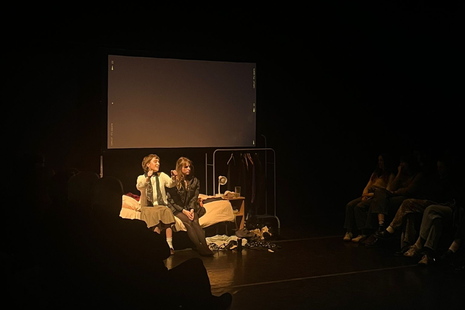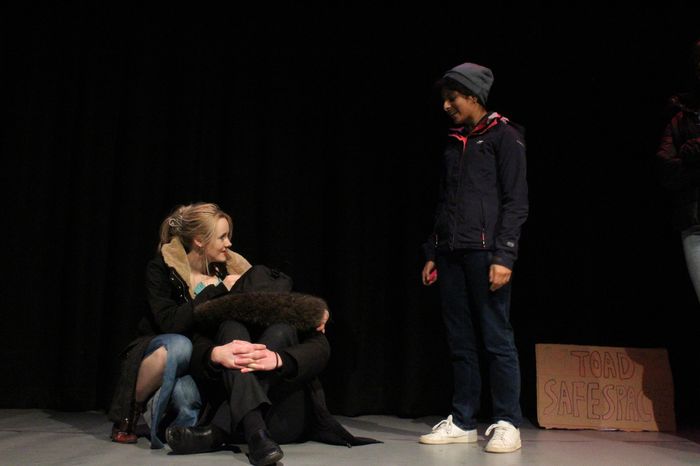Managed Approach is masterful
This poignant student-written drama highlights the stories of those involved in sex work and the communities around them, interweaving real-life interviews with striking re-enactments

Managed Approach is a dry-sounding euphemism for a contentious social experiment: the UK’s first legalised red-light district. From 2014-2020, sex work was decriminalised in Holbeck, Leeds, aiming to protect sex workers and control the trade. This radical move sparked years of protests and debate in the area about the legalisation of sex work – discussions that dominated the childhood of playwright Jules Coyle.
In a conversation before the show, Coyle explained that the play was partly written as a response to realising that most people in Cambridge had never even heard of this scheme that had been so central to her experience growing up. The severe information divide between the North and South, and the general lack of northern voices and northern women’s voices in Cambridge, are themes that permeate the show, which debuted with the Queen’s college BATS society.
“It is rare to find a piece of media about recent events that places us so deeply in the heads of those on both sides of a conflict”
Judging from the standing ovation and grins all around on opening night, the audience agreed with me that this was a really impressive show. It is rare to find a piece of media about recent events that places us so deeply in the heads of those on both sides of a conflict. The confidence of the writing suggests that Coyle’s ideas on this topic have been fermenting for a long time, that there is a strong familiarity with the local issues and history. This is coupled with some dedicated research work – Coyle interviewed sex workers about their experiences, asking them about how they began in the trade, their opinions of the Managed Approach and how they see their futures. Verbatim re-enactments of their responses are cleverly interspersed throughout the story, resonating and contrasting with the drama.
Technically, Lily Ellis’s direction is very slick – this is a show with a lot of time jumps, flashbacks, and cuts between viewpoints, but made easy to follow through effective lighting and inventive staging. I particularly enjoyed Stan Hunt’s sound design which, in an opening newsreel sound montage, elegantly introduces us to the key context we need, and later seamlessly transports us between such varied locations as an intimate bedroom to a raging protest.
The main narrative starts with the very relatable scene of teenager Abbie excitedly preparing for a great night out, and her mother, Kate, trying to hide her worry over how revealing her daughter’s outfit is. Both have lived in Holbeck their whole lives. They’re evidently close, yet avoid talking about a certain recent argument, and the play builds towards revealing the events leading up to it. As Abbie strides fearlessly out into the evening, and Kate waits up reminiscing, we explore how the conversations around sex work touch on memories of deeper traumas in Kate’s life relating to women’s safety.
“Ferguson expertly drew the audience in, recounting anecdotes with humour, compassion and self-awareness”
The premise is evidently heavy, but this is, perhaps surprisingly, a joyous show, in no small part due to the warmth and abilities of the cast. Jules Coyle, as the exuberant Abbie, had the audience laughing from the moment she danced onstage with the sheer energy of her performance and comic timing. But as a night out takes some unexpected turns, she also delivers some of the show’s most tense moments when that bravado slips and is replaced by a visceral dread. Yet, the role with the most emotional heavy-lifting was Kate – and Eanna Ferguson did an incredible job. It’s not easy to make a theatrical monologue feel as intimate as talking to a close friend, but Ferguson expertly drew the audience in, recounting anecdotes with humour, compassion and self-awareness. The writing and acting generated the sense of an entire life lived, which provided critical context for later decisions.
The interspersion of verbatim interviews was a powerful way to include the voices of those most affected. Harriet Haylock and Tel Chiuri completely embodied the mannerisms and inflections of the real, interviewed sex workers, allowing the audience to decide on their own interpretation of their stories. What struck me was the ambivalence with which the interviewees seemed to regard the Managed Approach concept – perhaps because it could only make a tiny difference to a complex situation.
The importance of the Leeds setting came up several times – the playwright mentioned that part of the fun was in getting the cast to put on northern accents. There was an affectionate specificity to the language, vocabulary and references that had in-the-know audience members laughing in a way that was a welcome change from the often self-referential Cambridge creative scene.
All-in-all, Jules Coyle and the ‘Managed Approach’ team have created something really special – it’s clever, empathetic, and very moving. This is an ambitious and beautifully-executed use of theatre to engage with an important topic; and I think everyone involved should feel very proud.
Managed Approach is showing at Fitzpatrick Hall, Queens’ College from Friday 8th until Sunday 10th November, at 8pm.
 News / Right-wing billionaire Peter Thiel gives ‘antichrist’ lecture in Cambridge6 February 2026
News / Right-wing billionaire Peter Thiel gives ‘antichrist’ lecture in Cambridge6 February 2026 Features / From fresher to finalist: how have you evolved at Cambridge?10 February 2026
Features / From fresher to finalist: how have you evolved at Cambridge?10 February 2026 Film & TV / Remembering Rob Reiner 11 February 2026
Film & TV / Remembering Rob Reiner 11 February 2026 News / Churchill plans for new Archives Centre building10 February 2026
News / Churchill plans for new Archives Centre building10 February 2026 News / Epstein contacted Cambridge academics about research funding6 February 2026
News / Epstein contacted Cambridge academics about research funding6 February 2026










